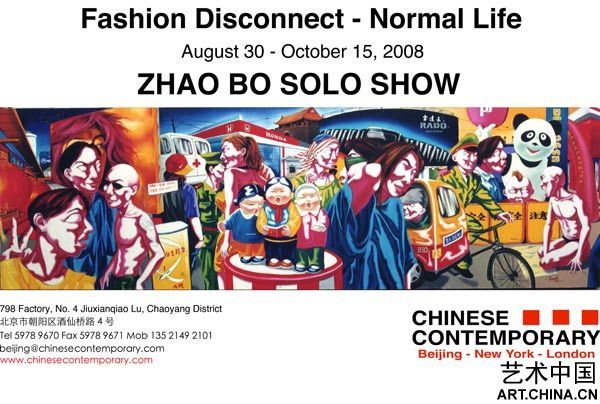
中國(guó)當(dāng)代
趙波個(gè)展 - “與流行無(wú)關(guān)”
2008年8月30日-10月15日
開(kāi)幕式: 2008年8月30日下午三點(diǎn)
中國(guó)當(dāng)代畫(huà)廊很榮幸地向大家發(fā)布藝術(shù)家趙波個(gè)展的消息。藝術(shù)家準(zhǔn)備了15幅油畫(huà)作品,將于2008年8月30日-10月15日在位于798工廠內(nèi)的中國(guó)當(dāng)代畫(huà)廊展出。與此次展覽相配備的畫(huà)冊(cè)也已印刷,屆時(shí),藝術(shù)家本人將會(huì)到場(chǎng)。
趙波畢業(yè)于四川美術(shù)學(xué)院,作為“新現(xiàn)實(shí)主義”的一份子,趙波展示了他對(duì)傳統(tǒng)現(xiàn)實(shí)主義在當(dāng)代藝術(shù)范疇內(nèi)的解釋,所針對(duì)的對(duì)象是現(xiàn)今的城市,不同于早期帶有政治含義的先鋒派藝術(shù)。新現(xiàn)實(shí)主義藝術(shù)成長(zhǎng)在政治相對(duì)穩(wěn)定的時(shí)代,但問(wèn)題還是有的,那就是將歷史與霓虹燈輻照下的大好未來(lái)相結(jié)合。趙波的作品由雄渾的顏色與人物的肖像畫(huà)相接而成,展現(xiàn)了當(dāng)下消費(fèi)主義帶給原先人民公社式社會(huì)環(huán)境的變化。趙波于70年代出生,生長(zhǎng)在一個(gè)將中西方文化合璧-中山裝與Gucci, 四合院與摩天大樓的時(shí)代,在毛澤東時(shí)代的集體主義與1979年鄧小平時(shí)代的改革開(kāi)放兩套領(lǐng)導(dǎo)路線之間,藝術(shù)家找到了創(chuàng)作的靈感,使其作品更有深度。
最近,趙波從中國(guó)人口擁有3000萬(wàn)人口的重慶遷至中國(guó)的文化中心北京,讓他更強(qiáng)烈地感受到了名牌文化對(duì)城市的侵蝕,刻畫(huà)了正在被各種快餐品牌,公司商標(biāo),飲料商標(biāo)淹沒(méi)的城市容貌,將其與拔地而起的城市建設(shè)相結(jié)合,在不協(xié)調(diào)的空間中,著重地展現(xiàn)了藝術(shù)家對(duì)這種不現(xiàn)實(shí)感覺(jué)的憂慮。藝術(shù)家將這種不現(xiàn)實(shí)的感覺(jué),以“取而代之”的藝術(shù)手法得以體現(xiàn),將阿迪達(dá)斯的商店,百事可樂(lè)的廣告牌,大眾汽車的甲殼蟲(chóng)取代了我們腳下真實(shí)的土地。
觀眾可以馬上看見(jiàn)各種各樣的商標(biāo)如麥當(dāng)勞,肯德雞,可口可樂(lè),米老鼠,但是畫(huà)布上面的人物們卻別有一番風(fēng)趣。他們表情猥瑣,好像隱藏著只有自己才知道的秘密。為了加深這種創(chuàng)作思維,藝術(shù)家故意將他們的視線不交錯(cuò)于參觀人們的視線。畫(huà)面上人物突出的眼球,無(wú)神的眼瞳散出的目光與畫(huà)面形成銳角,好像在互相對(duì)視或者看著畫(huà)布以外的什么東西。
除了大幅的油畫(huà),趙波的作品還包括小型的油畫(huà),將加重字體的西方商標(biāo)與一件富有中國(guó)特色的文化物件擺放在一起,比如一盞燈籠,一顆紅星。在這些小型油畫(huà)中,趙波用中國(guó)的元素給輕飄飄代表消費(fèi)主義的商標(biāo)起著加重的作用。趙波的作品的共性,就是對(duì)消費(fèi)主義的質(zhì)問(wèn),質(zhì)問(wèn)它的享樂(lè),它的貪婪,它那看似存在著的“富饒”。這些促成了人們心目中對(duì)西方商品的向往,這種向往什么時(shí)候會(huì)不會(huì)徹底地取代人們對(duì)中國(guó)的傳統(tǒng)的向往?未來(lái)是無(wú)法預(yù)見(jiàn)的,但是趙波在自己的作品中捕捉到了21世紀(jì)全球化大方向下的中國(guó),其生命力,其雜亂無(wú)章和自相的矛盾。
趙波的作品于國(guó)內(nèi)外多次展出。收藏于多個(gè)收藏家及公共美術(shù)館,如美國(guó)科羅拉多州Kent & Vicky Logan收藏系列,美國(guó)德克薩斯州Chaney Family收藏系列,美國(guó)丹佛美術(shù)博物館,上海當(dāng)代藝術(shù)館, 深圳何香凝美術(shù)館等。
[專稿] 趙波個(gè)展-“與流行無(wú)關(guān)”
Chinese Contemporary Gallery
Zhao Bo – FASHION DISCONNECT
August 30 – October 15, 2008
Opening: August 30, 2008, 3 pm
For immediate release – Chinese Contemporary Gallery is pleased to announce the opening of Zhao Bo’s solo exhibition FASHION DISCONNECT. The artist has prepared fifteen new paintings that will be on display 30 August – 15 October 2008 at Chinese Contemporary’s Beijing gallery in Factory 798. The opening will be 30 August 2008 at 3 pm and the artist will be present. A catalogue has been produced in conjunction with this exhibition.
A graduate of the Sichuan Academy of Fine Arts and a part of the “New Realists”, Zhao Bo demonstrates extraordinary talent in his interpretation of traditional realism within a contemporary stage, namely that of the modern Chinese city. Unlike the political motivations of earlier avant-garde artists, New Realists came to age in an era of relative political stability, when one of the most pressing dilemmas is the forced reconciliation of the past and the neon-lit future. Awash in bold colors and chaotic iconography, the artist’s canvases serve as portals into the fragmentation that consumerism has wrought upon China’s once communal experience. Born in the 1970s, Zhao Bo grew up in a country of immense transition – bridging the divide of West versus East, Mao jackets versus Gucci, hutongs versus skyscrapers. It is this tension between the societal juxtapositions of life under the collectivism of Mao’s rule and that of post-1979 Deng Xiaoping Reforms that lends poignancy to his works.
Having recently moved from Chongqing, the most populous city in China overflowing with more than thirty million residents, to Beijing, the country’s international capital, Zhao Bo has witnessed firsthand the advent of the name brand culture and its insidious infiltration of the urban landscape. The artist depicts his nation nearly choking in the suffocating grasp of fast food restaurants, corporate mascots, soda brands, and so on. Highlighting his concern with the frantic and multi-layered development of the contemporary Chinese city, the artist positions figures within an incongruous space. Zhao Bo hints at the impossibility of such an excessively cluttered cityscape by excluding solid ground. Instead, it is the compilation of the familiar products of our time – Adidas stores, Pepsi billboards, Volkswagon Beetles – that serve as a reference point for reality.
Though the logos of the international corporate giants strewn across the canvases - McDonalds, Kentucky Fried Chicken, Coca Cola, Mickey Mouse - are instantaneously accessible to the viewer, the figures embedded within their framework remain aloof. Their deviant facial expressions suggest a considerable inside joke acknowledged by those who have saturated themselves in this garish explosion of consumption. This is emphasized by the realization that not a single figure meets the audience’s gaze, rather their bulging eyes and emotionally void pupils are skewed at acute angles, either engaging each other or focused on a distant point far from the restrictive boundaries of the canvas.
In addition to large-scale paintings, Zhao Bo has also created smaller scale vignettes, placing a large, bold Western brand adjacent to something typically Chinese such as a lantern or red star. Within these paintings, Zhao Bo takes care to incorporate emblems of his country to serve as ballast against the kitsch logos that have become commonplace to most Chinese. As in all of his paintings, the artist seems to be asking, what is it about the consumerism, the greed, the insatiable ingestion of tangible ‘prosperity’ that has catalyzed the preoccupation with Western products and how long before this supercedes the semblance of a unified Chinese traditional culture? The future may be unclear, but Zhao Bo has captured the vitality, frenzy and contradictions of China’s 21st century globalization.
Zhao Bo's works have been shown extensively in China and abroad. They are in many prestigious collections, such as the Kent and Vicki Logan Collection in Colorado, the Chaney Family Collection in Texas and the Denver Art Museum. His paintings have been included in exhibitions at the Denver Art Museum, the Museum of Contemporary Art in Shanghai and the He Xiangning Art Museum in Shenzhen.
|

